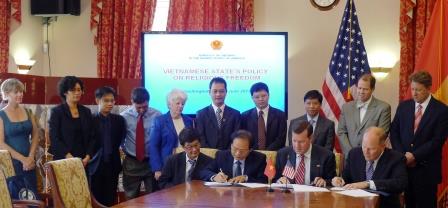Center Signs MOU Concerning Religious Freedom with Vietnamese Delegation and IGE

Washington, D.C. – (June 27, 2013) For over 10 years, the Institute for Global Engagement (IGE), in partnership with its Vietnamese country partners have convened government and religious leaders to build consensus about how to best make religious freedom viable and sustainable in Vietnam. Through IGE’s work with government officials and religious organizations, IGE has catalyzed and contributed to sustainable change in the country, developing trusted networks of partners with which to inculcate policies that ensure that people of all faiths and none have full freedom of conscience and can participate equally as citizens in public life. As a result of this history of engagement, on June 19, 2013 IGE was invited to partner with the Vietnamese Embassy to host an unprecedented series of events to discuss religious freedom in Vietnam. These dialogues were a direct result of IGE’s track record Vietnam, and serve as a practical example of track 1.5 diplomacy—the convergence of Track 1 (government) and Track 2 (grassroots organizations) diplomacy.
The events were chaired by the Vietnamese Embassy’s Deputy Chief of Mission, Dr. Nguyen Vu Tung and IGE’s President, Dr. Chris Seiple. Those present at the dialogue included participants from the International Religious Freedom (IRF) Roundtable, professors from BYU, staff from the Vietnamese Embassy’s political division, and a Vietnamese delegation from the University of Social Sciences and Humanities at the Vietnam National University (USSH/VNA). Participants held frank discussions about progress, challenges, and improvements needed for people of faith and policy making/implementation in Vietnam. The dialogue addressed pressing issues regarding religious freedom such as: the Vietnamese government’s new policy on religion (the new Decree 92); the difference between registered and unregistered religious groups; the requirement and process of religious registration; issues of religion and civil house arrest; and, visions for the future of religious freedom and religious pluralism in Vietnam.
Following the dialogue, a roundtable on “Vietnam’s Policy on Religious Freedom” took place. The Vietnamese Ambassador to the U.S. Nguyen Quoc Cuong delivered opening remarks followed by two key speakers, Professor Do Quang Hung, a prominent scholar on religion and rule of law from USSH/VNA, and Dr. Chris Seiple from IGE. The keynotes addressed the Vietnamese government’s efforts towards ensuring religious freedom for its citizens of faith over the past 20 years as well as “shortcomings” of the current policy and policy implementation on religion, especially at local levels.
Dr. Seiple remarked that: “The Vietnamese government has come a long way. However, there needs to be more space at the local level to address religious freedom issues. Two years ago, who could have imagined we [American NGOs, the Vietnamese ambassador, and Vietnamese government officials] would be meeting here, at the Vietnamese embassy in Washington, D.C., to talk about religious freedom in Vietnam?”
Upon the conclusion of the roundtable, the USSH/VNA, IGE, and BYU signed two agreements to further their collaboration to study the implementation of religion and rule of law in Vietnam. These agreements will enable USSH/VNA to apply for funding from the Vietnamese government to do comparative studies on religion and rule of law in Vietnam and the U.S. and make recommendations to the Vietnamese government regarding their policy on religion. If funded, this research would be a milestone for religious freedom progress in Vietnam, potentially marking this as the first time the Vietnamese government will fund such research themselves, signaling that after 10 years of work, IGE and its in-country partners are helping to shift the mindsets of government leaders, and starting to see a real change in behavior.
Vietnam’s television station, VTV1, televised the event and interviewed Professor Do Quang Hung and Dr. Chris Seiple. A link to the news report can be found here.